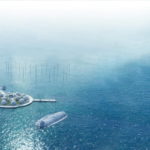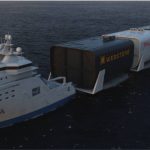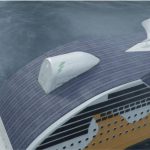Energy transformation, the digital universe and new business models will affect shipping. Wärtsilä has developed six concepts which range from the zero-emission smart ship, joint fleet operation to a renewable energy chain
Main challenges for ship operators are both to lower the fuel cost of their operations while on the other side[ds_preview] to maintain as high as possible income. On the global shipping market both the fuel cost as well as the freight rate fluctuate. In quite a number of years now this has led to high pressure on the shipping community.
New shipping concepts, which include new business models driven by new technologies, would be a preferred way out of the current situation. In developing these new concepts the use of new technologies from other parts of the industry, especially those who benefit from large numbers (consumer related) can provide ideas. The three major challenges the shipping industry has to solve are to develop a new energy carrier not based on fossil fuel, to develop business models supported by multiple players and to figure out how to benefit from new digital technologies.
Wärtsilä believes that battery energy capacity will increase 10 to 20 times in the next ten years. Pretty much all short sea challenges can be solved on battery operation, charged from clean energy sources. 50% of research funding to major universities is channeled into clean energy production. The production of electric power from sunlight shows increasing efficiency while the price is plummeting and we see a trend of local energy production, to a lower cost and based upon green energy production. The EXERGO concept combines these elements. A large package of batteries stores the energy for main propulsion. Batteries in combination with a fuel cell drive a power plant, which is clean and flexible. The main benefit of the operator is that this ship designed around the energy storage and will be able to sail completely without emissions. The unlimited energy storage on board will enable the ship to connect to green sources of energy.
The current state of the art of the use of batteries is hybrid installations. The main reason for combining mechanical and electric systems is the limited capability of batteries. The increased investment cost of other than pure mechanical systems today is not supportive of a rapid growth towards energy storage. Yet for applications which require a lot of flexibility with respect to the operation in various conditions, the use of batteries will enhance the performance.
Better energy storage will allow ships to benefit from low cost energy produced by either solar or wind power. Connecting data, sensors, and systems will enable operators to have the highest energy efficiency for every operating mode.
Leasing clean technology
Today, nobody knows how future requirements will look like. Legislation will certainly change over the coming 20 years. A solution based on leasing clean technology has major benefits: upgrades will be included, the operator is flexible in case power changes need to be made. Combined with power storage, renewable energy can be used in combination with the fuel cell power. Lease partners would have a similar business target as the operators. They would benefit directly from increased availability and reduced maintenance cost.
For the current technology the direct cost of a new system is always higher than of conventional systems. Thus, new technologies are not well supported. A ship owner normally is not easy to invest more in new technologies although there is a positive payback after several years. Also in the contract between ship owner and shipyard fixed investment cost is usual. Therefore builders will seek to use the least expensive – but will they also have the lowest maintenance cost?
By taking away the initial investment there is an automatic alignment between the interest of the operator and the leasing party. Of course, new standards and ways of working need to be developed. Here we can copy used templates in other parts of the industry such as in power plant businesses.
Making use of leasing business models fit in the trend towards more fixed operating cost. It will enable suppliers to focus on the operational targets that matter most to the operator. A guaranteed reliability focuses the use of clean energy sources. Renewables grow worldwide year after year, while the acceptance of fossil fuels decreases.
Convoys and modular transport
By operating in a convoy, up to 30% fuel could be saved by trailing in the wake of each other. The ships trailing behind the Master have no crews on board. The Convoying of crewless ships requires systems’ autonomy, Artificial Intelligence and advanced connectivity. The forward ship would have the captain on board, while the others would operate on adaptive autopilots. As all ships are connected safety it is guaranteed that the followers will respond to changes in powering always faster than the forward ship. The fastest responding ships will be operating behind. The biggest and slowest one will be operating up front. The use of spare parts, tools, and equipment is based on the sharing economy principle. The ships are also standardised, built in larger series at lower cost.
Another principle of the sharing economy is based on the smaller size of the vessel. The idea is to keep ship full while operating all the time. Smaller ships built in larger series would reduce the cost. Better optimised for performance, modularised and easy to build. Risk and investment cost would be lower. The economy of scale driving the large container vessels would finally be challenged by a different concept.
Wärtsilä might join new global players in a new platform for shipping transportation, where the principles of everybody sharing the same information all the time applies. The introduction of block chain technology into trade will change this business. There will be more common sharing of assets and sharing of information. The middlemen will disappear, and the transportation on sea will be much more efficient. This will make it easier for new players to enter the field of shipping transportation. Imagine joining up old and new ship operators with a digital tool that makes sure no ship sails cargo-free. Sharing assets saves money.
Floating distribution hubs
Main stakeholders of modularised transport will be producers or transporters of large volumes. They need to be flexible in transport needs – always full units will be transported. This increases overall transport efficiency. But the ultimate goal must be emission-free transportation at sea, Wärtsilä says. Could this be achieved by an artificial islands located along shipping routes? Local production of renewable and clean fuel could take place here. Refuelling of the vessels and redistribution of goods to battery-driven shortsea ships takes place in an optimised and safe operation. The ocean going-ship visualized in this concept is even submerged and by that saving 30% in fuel consumption. These ships must be designed for unmanned operation, nobody wants to be a sailor submerged for 30 days.
Renewable energy is linked to support direct sailing of ships. The current trend in increasing capacity of renewables at lower cost per kWh is supporting this trend. The use of energy efficient vessels, in combination with H2 as potential fuel will support the transition from fossil fuel to renewable energy.
In another concept Wärtsilä proposes floating factories, coffee roasteries for example. Again, exploring new business models.
In review, the main challenge for introducing these concepts will not be the technology itself. It is mainly to find ways to introduce these more expensive systems in an industry under cost pressure. The way this may work is to focus on new business models which will enable operators to invest less and gain more. New ways of thinking, hard work and the focus on these long-term concepts will support the way forward.
Authors:
Teus van Beek, Wärtsilä, Teus.vanbeek@wartsila.com
Egil Hystad, Egil.Hystad@wartsila.com
Teus van Beek, Egil Hystad






















